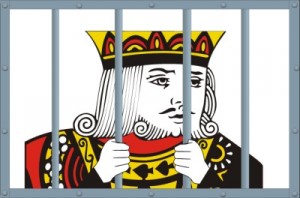Regulatory Focus: Is Online Gambling Illegal in Germany?
In the past few years, Germany has taken one of the strictest stances in Europe on online gaming (including online poker) by completely prohibiting it and imposing steep penalties for non compliance. In this article I will outline what the legislation is currently and how it is likely to change in the near future.
-
Interstate Gambling Treaty which came into effect on 1 January 2008:
Under section 4(4) of the Act, there exists a blanket ban on online gambling (games of chance), including poker. This ban applies whether an operator is foreign or domestic, state-run or private. The law goes so far as to cover placing a bet from Germany with a gaming company outside the country.
In addition, advertising of gambling on television or the internet, as well as by all telecommunications media is prohibited. Advertising unlawful gambling via the internet is also forbidden. Furthermore, the treaty allows the gambling supervision authorities to prohibit banks and internet access providers (through blocking) to cooperate with online gambling providers.
Sanctions for non-compliance: According to the German Criminal Code, unauthorised organisation of games of chance, incur a liability of up to five years’ imprisonment, while promotion of public gambling activities is punishable by up to one year imprisonment.
As internet gambling is prohibited under the treaty it is ‘unauthorised’ and covered by these provisions. There is also an express prohibition on participation in unauthorised games of chance which is punishable by up to six months’ imprisonment or a fine of up to 180 times the average daily income of the person committing the offence.
In reality, there have been no convictions of individuals gambling online.
German-Spec ific Challenges to the European Commission and ECJ
ific Challenges to the European Commission and ECJ
On 31 January 2008 the European Commission issued formal infringement proceedings regarding the Interstate Treaty. The commission expressed concern that a complete ban on the use of the internet was neither proportionate nor justified and that German gambling law as a whole may not be consistent as its provisions do not apply to horse racing or slot machines which are regulated at federal level. In addition, between 2006 and 2008, eight cases have been referred to the ECJ from German courts all of which call into question the state monopolies compatibility with EU law.
This quagmire of uncertainty has meant that on the one hand some federal states have taken a hard line approach with a number of prosecutions and prohibition orders being issued against private operators and betting shops; and on the other hand some courts have been reluctant to convict those who have been prosecuted due to issues of compatibility with EU law. In this setting thousands of cases are before the national courts and Germany is the main battlefield in Europe between private operators and state monopolies.
Conclusion under Current Law
Despite all the enforcement avenues available to states against illegal operators, German consumers continue to place their bets online. According to a survey conducted by BITKOM in June 2008, 2.2m of Germans gambled online that year. The main operators in the country, including PartyPoker, Everest Poker, Bwin and Bet-at-home still operate largely without prosecution.
Recent court decisions show the difficulties with enforcing the online ban against illegal operators. While some courts confirmed official banning orders, others were annulled due to a violation of the territoriality principle. Enforcement action varied from state to state. North Rhein-Westphalia being one of the more proactive states, in particular the region of Düsseldorf, in enforcing the Interstate Gambling Treaty and in going after illegal operators. Alongside North Rhein-Westphalia, the states of Baden-Wüttemberg and Bavaria have also been the most active.
Looking to the future
Since the introduction of the Interstate Treat on Gambling in 2008, the Federal States’ revenue from gambling has dropped by 30 per cent according to the Deutsche Lottoverband (Association of German Lotteries). This was accompanied by a simultaneous growth in the black market, including 32 German matches alleged of match-fixing in the lower leagues.
The associated loss of jobs with roughly 40,000 to 50,000 jobs could have been created, tax revenue and added value for the German economy due to lack of advertising proceeds has lead for calls to liberalise the gambling market.
The Interstate Treaty ceases to be valid on 31 December, 2011 (section 28)(1) – although it could be extended further by the state prime ministers depending on the outcome of a review of the treaty’s effects, which will be presented at the end of 2011. The northern German State of Schleswig-Holstein has recently announced it plans to abandon the treaty altogether.
According to newspaper reports it is therefore unlikely that the German Federal States will agree on a prolongation of the treaty. Schleswig-Holstein strives to privatise games of chance and, at the same time, to cooperate with the providers to agree on sensible and prevention measures.
Author’s Analysis
Clearly, the complete prohibition of gambling in Germany has encouraged a boom in ‘black market’ activity and its undesirable effects. This was similar to what occurred during the prohibition of alcohol in the US in the 1920s.
Where there’s a will there’s a way as people who want to gamble online will find a way and for a lack of a suitable alternative, that has meant that many German citizens have been gambling at ‘underground-run’ remote and non-remote establishments.
Moreover, the German government failed to cash-in in terms of employment opportunities and potential tax revenue from gambling proceeds, particularly during a tough economic climate.
However, all is not lost as the situation in 2012 will be very different with the possibility Germany will introduce a licensing system similar to that that are being introduced in France , Spain and has been introduced in Italy. This will regulate the online industry and provide a safer environment for people to place bets / play poker and also means increased tax revenues that go back into the German economy.
Perhaps legislators can take a look at the success story that is Svenska Spel, Sweden’s State-owned Online Gaming company. Svenska Spel, which is part of the Boss Media Network, can boast as having 55% of Sweden’s online poker market. A portion of the tax revenue generated is used to support sports and non-government organisations that benefit the community. The rest goes back into Sweden’s economy. All in all, it can only mean good news for Swedish citizens.
Alexandre Rotenberg & Simon Dehaney LLB, LPC





